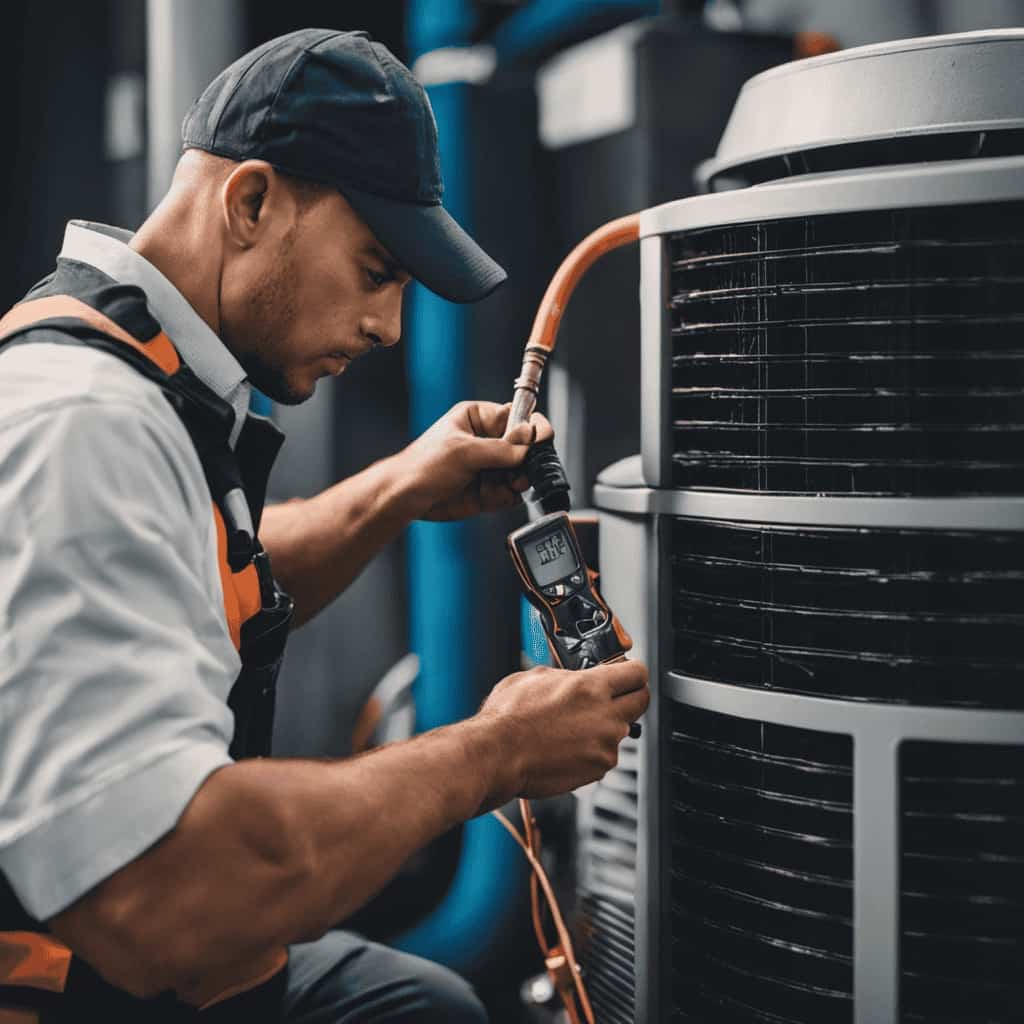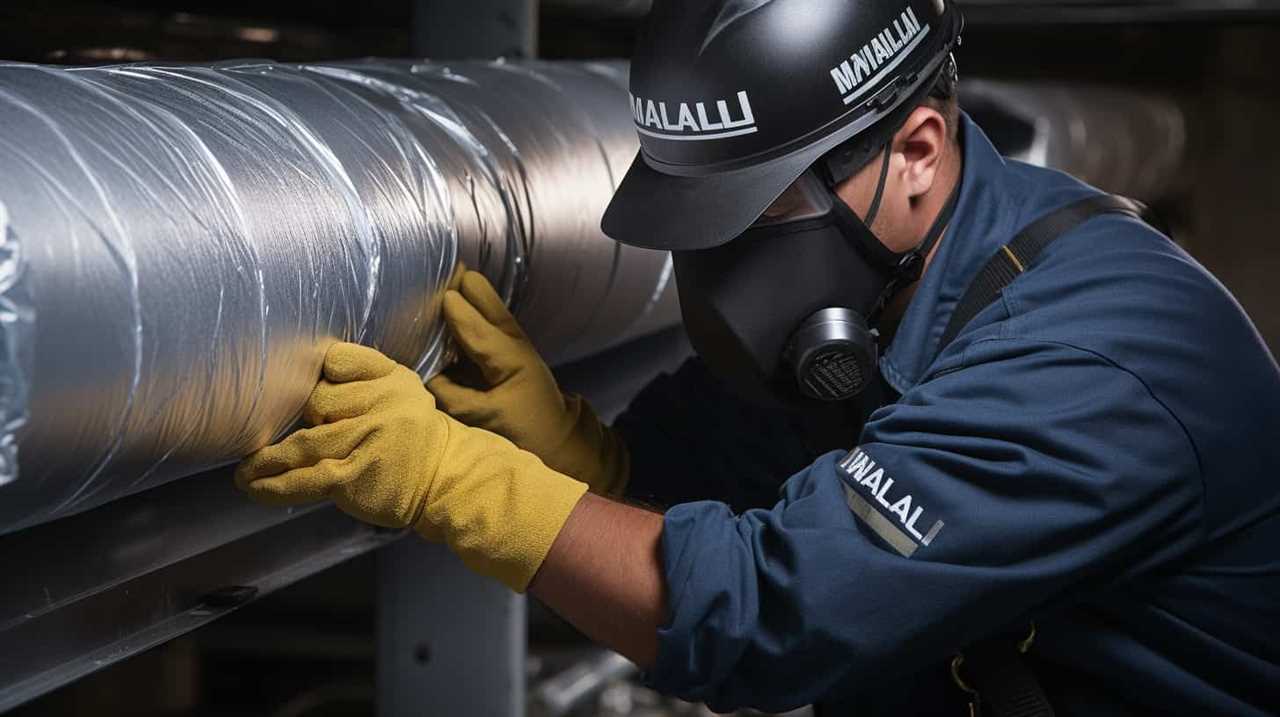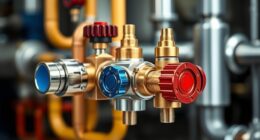Energy efficiency ratings are important when choosing heat pumps. We all aim to stay comfortable while using less energy. That’s why it’s crucial to understand energy efficiency labels.
By comparing the ratings of different heat pump models, we can make informed decisions and choose the most efficient option. In this article, we’ll explore the factors that affect energy efficiency and provide tips on how to select a heat pump that maximizes energy savings.
Let’s dive in together.
Key Takeaways
- Energy efficient heat pumps save money on utility bills and contribute to a greener future.
- Understanding energy efficiency labels helps in making informed decisions when selecting a heat pump.
- Regular maintenance is crucial for optimal performance and energy efficiency of heat pumps.
- Comparing energy efficiency ratings, such as SEER and HSPF, helps in selecting the most efficient heat pump.
The Significance of Energy Efficiency Ratings
Now let’s talk about why energy efficiency ratings matter when selecting heat pumps.

The importance of energy conservation can’t be overstated, and choosing energy efficient appliances like heat pumps is a significant step towards achieving this goal. Energy efficient heat pumps provide numerous benefits, both for the environment and for your wallet.
First and foremost, they consume less energy, resulting in lower utility bills. Additionally, they reduce greenhouse gas emissions, helping to mitigate climate change. By investing in energy efficient heat pumps, you not only save money in the long run but also contribute to a greener and more sustainable future.
Understanding energy efficiency labels is essential in making informed decisions. So, let’s delve into the next section to explore the intricacies of these labels and how they can guide you in selecting the right heat pump for your needs.
Understanding Energy Efficiency Labels
To better inform ourselves when selecting heat pumps, it’s important that we understand the energy efficiency labels. These labels provide valuable information about the energy consumption of the heat pump and can help us make informed decisions. Here are three key points to consider when interpreting energy labels and evaluating energy consumption:

-
Energy Efficiency Ratio (EER): This rating indicates the cooling efficiency of the heat pump. A higher EER means the heat pump consumes less energy to provide the same amount of cooling.
-
Seasonal Energy Efficiency Ratio (SEER): SEER measures the cooling efficiency over an entire cooling season. A higher SEER rating indicates greater energy efficiency.
-
Heating Seasonal Performance Factor (HSPF): HSPF measures the heating efficiency of the heat pump. A higher HSPF means the heat pump consumes less energy to provide the same amount of heating.
Understanding these energy efficiency labels will help us choose a heat pump that not only meets our needs but also saves us money in the long run.

Factors Affecting Heat Pump Energy Efficiency
Our understanding of the factors affecting heat pump energy efficiency is crucial in making informed decisions when selecting a heat pump.
Two important factors to consider are heat pump maintenance and the impact of climate on heat pump efficiency.
Regular maintenance is essential to ensure optimal performance and energy efficiency. This includes cleaning or replacing filters, checking refrigerant levels, and inspecting electrical connections. Neglecting maintenance can lead to decreased efficiency and higher energy consumption.
Additionally, climate plays a significant role in heat pump efficiency. Heat pumps are more efficient in moderate climates, where the temperature is neither too hot nor too cold. In extreme cold or hot climates, heat pumps may struggle to maintain desired indoor temperatures efficiently.

Understanding these factors will help homeowners choose a heat pump that suits their specific climate and maintenance needs, ensuring maximum energy efficiency and cost savings.
Comparing Energy Efficiency Ratings of Different Heat Pump Models
How do we compare the energy efficiency ratings of different heat pump models? Evaluating the efficiency of heat pump performance is crucial when selecting the right model for your needs. Here are three key factors to consider:
-
Seasonal Energy Efficiency Ratio (SEER): This rating measures the cooling efficiency of the heat pump. Higher SEER ratings indicate better energy efficiency.
-
Heating Seasonal Performance Factor (HSPF): HSPF measures the heating efficiency of the heat pump. Look for models with higher HSPF ratings for optimal performance.

-
Energy Star Certification: Heat pumps with the Energy Star label meet strict energy efficiency guidelines set by the Environmental Protection Agency. Choosing an Energy Star certified model ensures greater energy savings.
By comparing these energy efficiency ratings, you can make an informed decision on the most efficient heat pump for your home.
Now, let’s explore how to maximize energy efficiency in heat pump selection.
Maximizing Energy Efficiency in Heat Pump Selection
To maximize energy efficiency in our heat pump selection, we prioritize the selection of models with the highest energy efficiency ratings. By choosing heat pumps with superior energy efficiency, we can improve the performance of our heating and cooling system while saving on energy costs. To help you understand the benefits of selecting energy efficient heat pumps, here are three key factors to consider:

| Factor | Description |
|---|---|
| Seasonal Energy Efficiency Ratio (SEER) | Measures the cooling efficiency of the heat pump over an entire cooling season. |
| Heating Seasonal Performance Factor (HSPF) | Measures the heating efficiency of the heat pump over an entire heating season. |
| Energy Efficiency Ratio (EER) | Measures the cooling efficiency of the heat pump at a specific outdoor temperature. |
Frequently Asked Questions
What Are the Different Types of Heat Pumps Available on the Market?
There are different types of heat pumps available on the market. Geothermal heat pumps have the advantage of being more energy efficient compared to air source and ground source heat pumps.
How Does the Size of a Heat Pump Affect Its Energy Efficiency?
The size of a heat pump can greatly affect its energy efficiency. Factors such as proper sizing, insulation, and maintenance play a crucial role. By optimizing these factors, we can maximize the energy efficiency of our heat pumps.
Can I Use a Heat Pump as the Sole Heating and Cooling System for My Home?
Yes, we can use a heat pump as the sole heating and cooling system for our home. The benefits of using a heat pump include energy efficiency, cost savings, and year-round comfort. Proper heat pump installation is crucial for optimal performance.
Are There Any Government Incentives or Tax Credits Available for Purchasing Energy-Efficient Heat Pumps?
Yes, there are government incentives and tax credits available for purchasing energy-efficient heat pumps. These incentives and credits can help offset the cost of installing a heat pump and make it more affordable for homeowners.

How Often Should I Have My Heat Pump Serviced to Ensure Optimal Energy Efficiency?
We should regularly service our heat pumps to ensure optimal energy efficiency. By doing so, we can identify signs of inefficiency early on and take necessary actions to maintain our heat pumps’ performance.
Conclusion
In the search for the ideal heat pump, it’s crucial to consider energy efficiency ratings. These ratings not only determine the effectiveness of the device but also have a significant impact on our energy consumption and the environment.
Just as a compass guides us through unfamiliar territories, energy efficiency labels guide us towards a greener and more sustainable future. By choosing a heat pump with a high energy efficiency rating, we can ensure optimal performance while reducing our carbon footprint.









